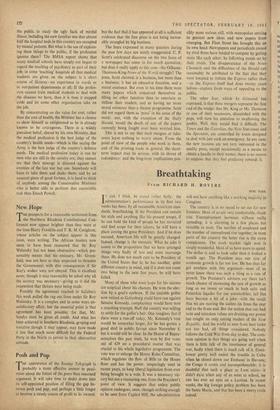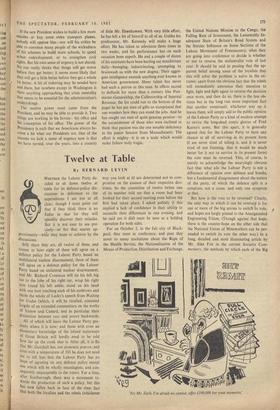Breathtaking
Ft um RICHARD H. ROVERE
NEW YORK
T can, I think, be stated rather flatly: the 'administration's performance in its first two weeks has been, by all reasonable American stan- dards, breathtaking. If the President can sustain his style and anything like his present tempo, if he can hold the kind of people he has recruited and find scope for their talents, he will have a place among the great Presidents. And if he does succeed, American life will be greatly changed. Indeed, change is the measure. What he asks is assent to the proposition that we have arranged things very badly of late and must rearrange them. He does not much care to be President of the United States that is; he has another, quite different country in mind, and if it does not come into being in the next few years, he will have failed.
Many of those who most hope for his success are sceptical about his chances. He won the elec- tion by a gnat's eyebrow. If the amiable golfer now retired to Gettysburg could have run against Senator Kennedy, complacency would have won a smashing triumph. Half the country was willing to settle for the golfer's heir. One imagines that if there were a run-off today, Mr. Kennedy's vote would be somewhat larger, for he has grown a good deal in public favour since November 8, but it would still be close. In the House of Repre- sentatives this past week, he won by five votes out of 429 on a procedural matter that was crucial to his whole legislative programme. The vote was to enlarge the House Rules Committee, which regulates the flow of Bills to the House floor and has the power, unsparingly used in recent years, to keep liberal legislation from ever being brought to a vote. It was a necessary vic- tory but not a reassuring one, from the President's point of view. It suggests that unless public opinion undergoes, soon, changes striking enough to be seen from Capitol Hill, the administration will not have anything like a working malority in Congress.
The country is in no mood to set out for new frontiers. Most of us are very comfortable, thank you. Unemployment increases without really spreading; it is alarming in a few places but invisible in most. The number of employed and the number of unemployed rise together; in most parts of the country the latter rise is the more conspicuous. The stock market right now is simply wonderful. Most of us have more to spend. The dollar is said to look safer than it looked a month ago. The President says our rate of economic growth is far too low. He has thus far got nowhere with this argument— most of us never knew there was such a thing as a rate of growth. The President's advisers say there isn't much chance of increasing the rate of groiah as long as we invest so much in bath salts and Potemkin facades for our automobiles; tail fins have become a bit of a joke—with the result that ssie are moving the useless tin from the rear end to the front end. But the notion that our bad taste and mistaken values are draining our power has caught on only among readers of the New Republic. And the world as seen from here looks not too bad, all things considered. Nobody follows the Cold War from day to day. The com- mon opinion is that things are going well when there is little talk of the imminence of general war, badly when there is much talk of it. Eisen- hower pretty well ended the trouble in Cuba when he closed down our Embassy in Havana; the Congo is comic and incomprehensible; it is doubtful that such a place as Laos exists—it didn't exist when any of us went to school, no one has ever set eyes on a Laotian. In recent weeks, the big foreign policy problem has been the Santa Maria, and that has been a merry crisis indeed.
If the new President wishes to build a few more missiles or buy some extra transport planes, nobody will oppose him—nor will his critics be able to convince many people of the wickedness of his schemes to build more schools, to speed Urban redevelopment, or to strengthen civil rights. But his own sense of urgency is not shared. No one really thinks that things will get worse before they get better; it seems more likely that they will get a little better before they get a whole lot better. A bit of tinkering may be needed here and there, but nowhere except in Washington is there anything approaching that crisis mentality that seems to be essential for the administration's undertakings.
The motive power must come from the President, and he may be able to provide it. Two things are working in his favour: his office and his conception of his office. The power of the Presidency is such that we Americans always be- come a bit what our Presidents are. One of the reasons we lack a sense of urgency now is that we have turned, over the years, into a country of little Mr. Eisenhowers. With very little effort, he has left a bit of himself in all of us. Unlike his predecessor, Mr. Kennedy will make a huge effort. He has taken to television three times in two weeks, and his performance has on each occasion been superb. He and a couple of dozen of his assistants have been hurling out manifestoes daily—besieging, indoctrinating, attempting to brainwash us with the new dogma. Their aggre- gate intelligence exceeds anything ever known in American government. Sheer talent has never had such a patron as this man. In offices sacred to dullards for more than a century (the Post- master-Generalship, the Collectorship of Internal Revenue, the list could run to the bottom of the page) he has put men of gifts so exceptional that one wonders how they can stand the jobs. And he has sought out men of quite genuine passion—to the astonishment of those who were inclined to think that passion was the one notable deficiency in the junior Senator from Massachusetts. The effort is mighty—it is on a scale which would make failure truly tragic.











































 Previous page
Previous page